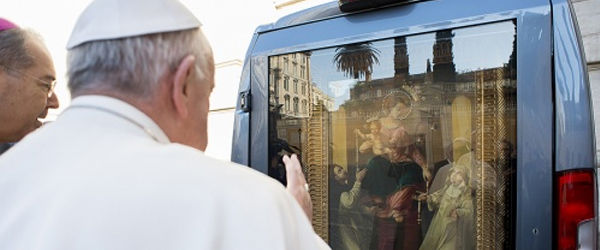The U.S. Department for Health and Human Services March 16 proposed new ways for religious organizations that have moral objections to providing free contraceptives to their employees to comply with the requirement.Among the suggestions proposed are having the costs covered by a "third-party administrator" of a health plan or "independent agency" that receive funds from other sources, such as rebates from drug makers.
The Obama administration also announced that most college student health insurance plans will have to include free contraceptive coverage. Although the policy will apply to all colleges and universities, religiously affiliated institutions will be given an additional year to comply with the mandate.
It also said colleges that have self-insured student health coverage plans will not be required to offer free contraceptive coverage.
Media representatives of the U.S bishops and Catholic health care and college organizations told Catholic News Service March 19 that they were still reviewing the proposals laid out in a 32-page document published March 16 in the Federal Register.
The proposal "would establish alternative ways" to fulfill the federal contraceptive mandate when health coverage "is sponsored or arranged by a religious organization that objects to the coverage of contraceptive services for religious reasons and that is not exempt under the final regulations published Feb. 15, 2012."
"This document serves as a request for comments in advance of proposed rulemaking on the potential means of accommodating such organizations while ensuring contraceptive coverage for plan participants and beneficiaries covered under their plans (or, in the case of student health insurance plans, student enrollees and their dependents) without cost sharing," the agencies said.
On Jan. 20 HHS announced that the federal government would require all employers, including religious employers, to provide no-cost coverage of all contraceptives approved by Food and Drug Administration as part of preventive health services for women. Only houses of worship are exempt.
In a revision announced Feb. 10 and published Feb. 15, President Barack Obama said religious employers could decline to cover contraceptives if they were morally opposed to them, but the health insurers that provide their health plans would be required to offer contraceptives free of charge to women who requested such coverage. His announcement did not answer how the mandate applied to self-insured religious employers.
The newly published proposal reinforces mandated contraceptive coverage at self-insured Catholic hospitals and social service agencies. It also stresses that the cost would not be directly paid by the employer but a "third-party administrator" or "independent agency."
Administration officials who spoke with reporters in a March 16 teleconference about the proposal stressed the need to find ways for the third-party administrators to offset costs of contraceptive coverage. They suggested that administrators could use funds from other sources, such as rebates from drug makers.
The administration is seeking public comment on the proposed ruling for the next 90 days before it makes a final decision.
In its announcement on college student health insurance plans, the Obama administration said institutions that provide self-insured student health coverage will not be required to offer free contraceptive coverage.
Mercy Sister Mary Ann Walsh, director of media relations for the U.S. Conference of Catholic Bishops, told CNS: "The bishops are studying the announcement which HHS put forth late Friday afternoon."
"We have to spend time reviewing it," Sister Carol Keehan, a Daughter of Charity who is president and CEO of the Catholic Health Association, likewise said.
The director of communications for the Association of Catholic Colleges and Universities said the organization was "still examining the notice released on Friday."
Steve Schneck, director of the Institute for Policy Research & Catholic Studies at The Catholic University of America, described the proposal as encouraging, particularly because of its comment-seeking period which he said can give Catholic leaders an opportunity for further input.
He also noted that the proposal clarifies some of the language in the federal health mandate and indicates that more religious institutions are exempt from the contraceptive coverage than previously realized.
"Religious institutions that get their insurance coverage under a higher institution that qualifies for the exemption will also get the exemption," he said. In other words, a Catholic school which follows the diocesan health insurance plan would also be exempt from the contraceptive mandate.
---CNS
To read more about U.S. bishops’ observations regarding the proposed mandate, see pages 10-11.

